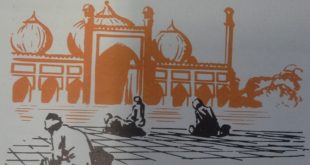Thirteen and a half centuries ago a new religion began in Arabia. Today millions of people are followers of this religion. It is called Islam and its followers, Moslems. All their lives long, Moslems must pray, in ways clearly prescribed, five times every day. No ordinary event must be allowed to interfere with these moments of prayer. Moslems must learn to recite their creed — a long statement of their religious belief. For one month each year they must fast all of every day from sunrise to sunset. They must give generously to charity. They should, if at all possible, …
Read More »Tag Archives: Baghdad
The Crusades 1096-1260
ON A COLD NOVEMBER DAY IN 1096, a great crowd of people gathered in a field at the town of Clermont in France. They had come from miles around and near them were pitched the tents they had put up for shelter. For some days, Pope Urban II had been holding a great council of cardinals, bishops and princes. Today he was to speak to the people and so many wanted to hear that no building was large enough to hold them all. A platform had been built in the center of the field and as Pope Urban stepped up …
Read More »The Coming of the Mongols A.D.1135-1368
IN 1135, Hangchow became the capital of the Southern Sung. Thereafter, the Sung kept an uneasy peace with their unwelcome northern neighbours, the Chin. Then, out of Mongolia came the mighty Genghis Khan, whose warriors and their descendants were to spread terror across Asia into Christian Europe and the lands of Islam. Before he died in 1227, Genghis had crushed the Hsi Hsia and all but crushed the Chin. His son, Ogodai, made a treaty with the Sung emperor, and the Sung and Mongol armies together put an end to the Chin. This alliance with a barbarian power turned out …
Read More »The Ottomans, the Last Great Islamic Power A.D. 1299-1922
ACCORDING to their tradition, the Ottoman Turks once belonged to the same Central Asian tribe as the Seljuk Turks. Their ancestors came to Asia Minor with the Seljuks. In time, they began to challenge the authority of their fellow Turks. The Ottomans took their name from a chieftain called Othman, who in 1299 became the emir of Seljuk lands bordering on the Byzantine Empire. Othman declared holy war on his Christian neighbours. His son Orkhan captured the city of Brusa and in 1362 Orkhan’s son Murad took Adrianople, beyond the strait and sea that separated Asia Minor from Europe. Thereafter, …
Read More »Christian Knights and Mongol Horsemen A. D. 099-1404
THROUGHOUT THE eleventh century, the divided Arab Empire became weaker in all its parts. Meanwhile, the Christian lands to the north became stronger. Adventures from northern France snatched Sicily and Southern Italy from the Arabs. The pope called on the rulers of Europe for a united Christian attack on the Moslems. By the end of the century, European knights in chain-mail armour were streaming into Syria by land and sea, determined to recapture the holy places of their religion. This campaign was the first of many. The Crusades dragged on for two centuries, with long periods of peace coming between …
Read More »Rival Caliphs and Amirs in the West A.D. 750-1492
IN 750, when the first Abbasid caliph ordered a wholesale massacre of the family that had ruled before him, hardly any of the Omayyads came out alive. One who did was a twenty-year-old youth named Abd-al-Rahman, a grandson of the tenth Omayyad caliph. Fleeing from a Bedouin camp on the Euphrates, he wandered in disguise through Palestine, Egypt and North Africa. Again and again he barely escaped being discovered and seized by Abbasid spies. His desperate flight lasted, altogether, five years. Finally he came to the town of Ceuta, on the northwest coast of Africa, where some Berber chieftains, who …
Read More »The Abbasids: Glory and Decay 750 -1258 A. D.
UNDER THE Omayyads, who ruled from 661 to 750, Islam had grown into a mighty empire. Arabic had become its language, while the Arabs, in turn, had picked up useful skills from the peoples they had conquered. The state had grown rich from the tribute paid by non-Moslems and the land tax paid by landowners. Though the caliphs were mainly concerned with pleasure and power, they had not neglected religion completely. They had built the Dome of the Rock in Jerusalem and the Omayyad Mosque in Damascus — two magnificent sanctuaries which were the holiest places in Islam after the …
Read More »





